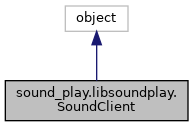This class is a helper class for communicating with the sound_play node via the sound_play.SoundRequest message. More...
Inheritance diagram for sound_play.libsoundplay.SoundClient:

Public Member Functions | |
| def | __init__ (self, blocking=False, sound_action='sound_play', sound_topic='robotsound') |
Public Attributes | |
| actionclient | |
| pub | |
| sub | |
Private Attributes | |
| _blocking | |
| _playing | |
Detailed Description
This class is a helper class for communicating with the sound_play node via the sound_play.SoundRequest message.
There is a one-to-one mapping between methods and invocations of the sound_play.SoundRequest message.
Definition at line 92 of file libsoundplay.py.
Constructor & Destructor Documentation
◆ __init__()
| def sound_play.libsoundplay.SoundClient.__init__ | ( | self, | |
blocking = False, |
|||
sound_action = 'sound_play', |
|||
sound_topic = 'robotsound' |
|||
| ) |
The SoundClient can send SoundRequests in two modes: non-blocking mode (by publishing a message to the soundplay_node directly) which will return as soon as the sound request has been sent, or blocking mode (by using the actionlib interface) which will wait until the sound has finished playing completely. The blocking parameter here is the standard behavior, but can be over-ridden. Each say/play/start/repeat method can take in an optional `blocking=True|False` argument that will over-ride the class-wide behavior. See soundclient_example.py for an example of this behavior. :param blocking: Used as the default behavior unless over-ridden, (default = false) :param sound_action: Namespace of actionlib to play sound. The actionlib interface is used only if blocking parameter is True. (default='sound_play') :param sound_topic: Topic name to play sound. The topic interface is used only if blocking parameter is False. (default='robotsound')
Definition at line 94 of file libsoundplay.py.
Member Data Documentation
◆ _blocking
|
private |
Definition at line 118 of file libsoundplay.py.
◆ _playing
|
private |
Definition at line 119 of file libsoundplay.py.
◆ actionclient
| sound_play.libsoundplay.SoundClient.actionclient |
Definition at line 123 of file libsoundplay.py.
◆ pub
| sound_play.libsoundplay.SoundClient.pub |
Definition at line 125 of file libsoundplay.py.
◆ sub
| sound_play.libsoundplay.SoundClient.sub |
Definition at line 126 of file libsoundplay.py.
The documentation for this class was generated from the following file: